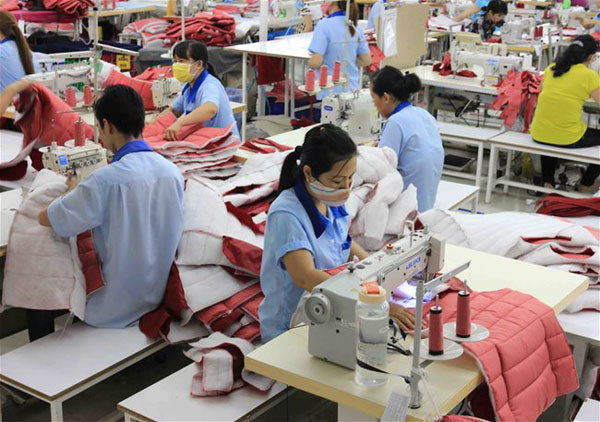according to HSBC’s Navigator report, which surveyed over 10,000 companies in 39 countries and territories across the globe, including 200 companies in Vietnam.
 |
| Employees work at a factory in HCMC – Photo: Thanh Hoa |
According to the report, the fact that more than half of Vietnamese companies remain optimistic about growth, well above the global average of 29%, can partly be attributed to Vietnam’s success in combating and eliminating Covid-19.
Vietnamese companies have been less impacted by the pandemic than their global counterparts, with close to three-fifths (59% compared to 45% globally) expecting to return to pre-Covid-19 levels of profitability by the end of 2021 and 86% by the end of 2022.
“Vietnam’s remarkable resilience and effective response to the pandemic has been a major contributor to the increased optimism. Unlike many other countries, from a purely domestic economy perspective, in the second half of the year, Vietnam is broadly back to a ‘business as usual’ environment,” noted Tim Evans, Chief Executive Officer of HSBC Vietnam.
“Needless to say, different sectors face their own particular challenges, but what most Vietnamese companies share in this survey, is a recognition that they will need to invest in order to capture future opportunities. Companies feel that by up-skilling staff, embracing new technologies and increasing their efficiency, they will be in a position to achieve their future growth plans,” he added.
To adapt to external factors, more than two-thirds or some 68% of Vietnamese companies implemented changes over the last 12 months, compared to 74% globally. Reducing costs, mitigating risk and increasing collaboration are the top drivers of the changes that businesses have made.
But cutting costs does not equate with cutting future investments. Some 88% of Vietnamese companies intend to increase investment in their business in the next year, significantly more than the two-thirds globally. Some 69% intend to focus their investment on sales channels, 68% on up-skilling their workforce, 67% on the customer experience and 67% on cash flow/capital management in 2021.
Vietnamese companies (91%) also remain more positive over international trade than their global peers (72%) in spite of the majority of businesses feeling that international trade has become more difficult. Vietnamese companies are more positive about their prospects for future international trade and they will continue to look for expansion in other markets.
Protectionism continues to be strongly felt, with 90% of Vietnamese companies thinking it is increasing. Price competitiveness, local partnerships and selling through digital channels are the key strategies to combat it.
Optimism in Vietnam will be further buoyed with the signing of the Regional Comprehensive Economic Partnership (RCEP) on November 15, 2020. The agreement has been heralded as the beginning of a new era in which Asian countries, including all ASEAN nations plus Australia, China, Japan, South Korea and New Zealand, will play a major role in setting the standards that will enable the next round of global growth.
“RCEP has brought 15 Asian nations together to help drive the agenda around increased cross border trade. As one of the region’s fastest growing and most dynamic economies, Vietnam has much to gain from this far-reaching free trade agreement,” said Evans.
“Offering faster, more efficient and tariff-free access to a market of some 2.3 billion people, the RCEP can help local firms in Vietnam increase exports and attract high-quality goods for their consumers. This time next year, we all hope that levels of optimism will have returned to the global economy.” SGT

Optimism about Vietnam economic rebound
Despite high economic openness and growing global uncertainties, Vietnam’s economy still maintains its resilience and is on track for a V-shaped recovery, stated economist Nguyen Minh Phong.

Vietnam becomes second most optimistic country in Q2 2020: Nielsen
After one year, Job security overtook Health to become No.1 concern of Vietnamese consumers.